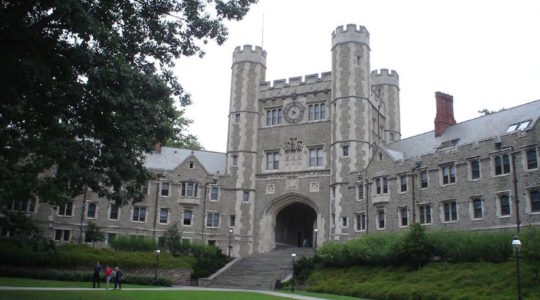WHIPPANY, N.J. (JTA) – New Jersey’s largest Jewish federation has launched a $50 million communitywide campaign that is being hailed as a groundbreaking collaborative effort in support of Jewish day school education.Eleven local families have committed $13.5 million toward the MetroWest Day School Campaign, which was launched officially on April 29.Under the plan, the three day schools in the federation’s service area will retain their own endowment funds while drawing on a community fund and a matching pool.Organizers said the goal is to make day schools more affordable and offer a standard of academic excellence equal to any private school in the area.The campaign is being coordinated by the Jewish Community Foundation of MetroWest, the planned giving and endowment arm for United Jewish Communities of MetroWest NJ. The $24 million federation serves Essex and Morris counties, and has its roots in Newark.”We want to increase enrollment at all three schools,” said Kim Hirsh, endowment development officer of the MetroWest foundation, who will staff the campaign. “We want to make day school available to all Jewish families. We have learned that enrollment is not just a matter of affordability; it’s also a matter of academic excellence.”The three schools are the Orthodox Joseph Kushner Hebrew Academy/Rae Kushner Yeshiva High School in Livingston; the Conservative Solomon Schechter Day School of Essex and Union, with campuses in West Orange and Cranford; and the nondenominational Nathan Bohrer-Abraham Kaufman Hebrew Academy of Morris County in Randolph.The campaign is the latest in a series of high-profile projects in support of day schools, according to Rabbi Joshua Elkin, executive director of the Boston-based Partnership for Excellence in Jewish Education, a partner in the local project.Elkin said, however, that the depth of the collaboration and the amount of money being raised for just three schools are unprecedented.”This is part of a wave of something new, but this is bigger than any other effort out there,” he said. “A goal of $50 million is a significant amount of money for three schools; very significant.”It’s also very significant that federation has dedicated staff to this project. In that sense it’s pace-setting.”Elkin said the campaign “raises the bar substantially as to what is possible.”Similar projects nationally include a $45 million gift for excellence in Boston’s day schools, a $50 million campaign to help reduce tuition in Chicago-area day schools, and $20 million for tuition assistance in Cleveland.But these areas have more than three schools to serve, according to Elkin.He added that the effort moves day school education “to the front burner of the community,” a shift he said has been occurring slowly around the country over the last 10 years.Part of that shift has been driven by studies showing that those with a day school education are more likely to demonstrate connections with Jewish life into adulthood, from marrying Jews to affiliating with synagogues.The campaign was described as a “coming of age” for the Jewish community by Rabbi Irving “Yitz” Greenberg, who spoke at a ceremony announcing the launch.Greenberg, president of the Jewish Life Network and PEJE co-founder PEJE, said the project marks “a fundamental transformation of the Jewish community, when we say whatever it takes to flourish in freedom, that’s what we should do.”The local schools collectively are spending $2.3 million on scholarships, which are largely supported through fund raising and UJC MetroWest.”We know this is not enough,” said UJC MetroWest President Kenneth Heyman in a statement. “The wealthy can afford tuition, moderate-income families are on scholarships, and those ‘in the middle’ are getting squeezed out.”UJC MetroWest’s Jewish Community Foundation has donated $1 million to the campaign.The three participating schools have said that the way the funds are structured was critical in securing their commitment and participation. The schools will design their own tuition reduction and academic enhancement programs, but will also take part in communitywide initiatives funded through the Community Fund.The fund will be governed by a day school council with representatives from each school, UJC MetroWest, JCF MetroWest and independent members.According to Hirsh, the impetus for the campaign came at least in part from Jerry and Paula Gottesman of Morristown. They began a program at the Hebrew Academy of Morris County that capped tuition for middle-income families.The program is now widely considered a national model, and both Schechter and Kushner say they will look to it as they design their own.”Middle-income people could not afford to send their kids,” said Jerry Gottesman, chairman of Edison Properties, a real-estate, parking and storage business. “It was either kids on scholarship or the children of dentists and doctors. There was no middle ground.”Funds from the Gottesmans also enabled the Hebrew Academy to begin implementing academic enhancement projects. Last fall the academy was named a National Blue Ribbon School of Excellence by the U.S. Department of Education.”Our open houses usually draw two to three families; this year we’ve had 15 to 20,” said Naomi Bacharach, the academy’s director of marketing and development. “The interest level in our school is soaring. We are also seeing increased retention from kindergarten to first grade, when we usually have a dip, and in the middle school.”Administrators at the Schechter and Kushner say they have families whose children either leave or don’t apply due to tuition costs.”Consider a family making $200,000 with four kids in day school,” said Kushner executive director Michael Grad. “The tuition bill can be more than $60,000. Can they make it?”If they were making $50,000 it wouldn’t be an issue,” he said, because a family in that financial situation would be getting assistance.Kushner has seen its enrollment drop from 847 students to 747 in the last five years, which Grad called a “significant” change, one he believes is due at least in part to rising tuition.Schechter families face similar financial challenges, combined with the fact that day school is not as inevitable an option in the Conservative movement as it is among the Orthodox, said Schechter’s head of school, Joyce Raynor.”We have anecdotal evidence of people who say, ‘We’re leaving. Please understand we love the school but our financial situation has changed’ or ‘We’re struggling with three children in the school’ or ‘I’ve lost my job, ‘ ” Raynor said. “Where do they go? They go to public school.”
JTA has documented Jewish history in real-time for over a century. Keep our journalism strong by joining us in supporting independent, award-winning reporting.





